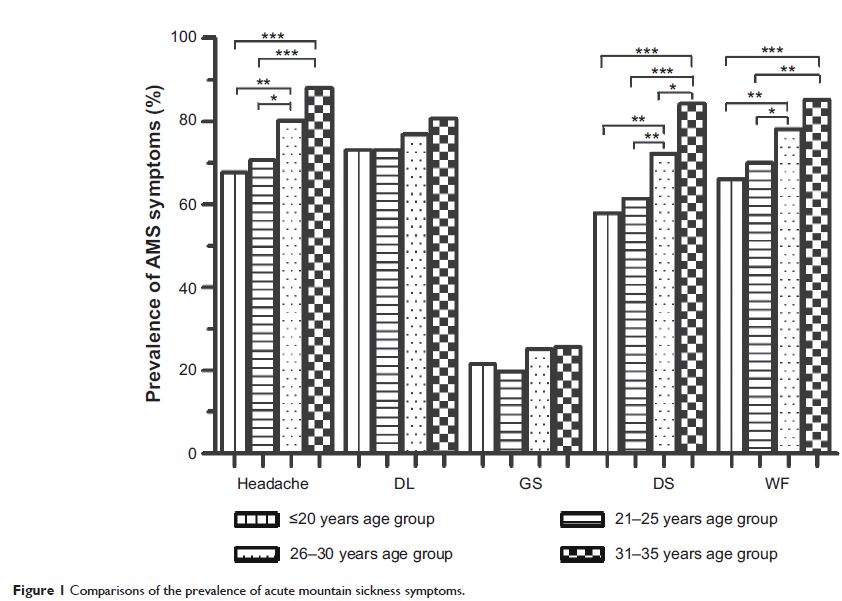109451
论文已发表
注册即可获取德孚的最新动态
IF 收录期刊
- 3.4 Breast Cancer (Dove Med Press)
- 3.2 Clin Epidemiol
- 2.6 Cancer Manag Res
- 2.9 Infect Drug Resist
- 3.7 Clin Interv Aging
- 5.1 Drug Des Dev Ther
- 3.1 Int J Chronic Obstr
- 6.6 Int J Nanomed
- 2.6 Int J Women's Health
- 2.9 Neuropsych Dis Treat
- 2.8 OncoTargets Ther
- 2.0 Patient Prefer Adher
- 2.2 Ther Clin Risk Manag
- 2.5 J Pain Res
- 3.0 Diabet Metab Synd Ob
- 3.2 Psychol Res Behav Ma
- 3.4 Nat Sci Sleep
- 1.8 Pharmgenomics Pers Med
- 2.0 Risk Manag Healthc Policy
- 4.1 J Inflamm Res
- 2.0 Int J Gen Med
- 3.4 J Hepatocell Carcinoma
- 3.0 J Asthma Allergy
- 2.2 Clin Cosmet Investig Dermatol
- 2.4 J Multidiscip Healthc

已发表论文
年轻成年中国男性迅速攀登到 3,700 米时,年龄成为急性高原病的危险因子
Authors Tang XG, Zhang JH, Qin J, Gao XB, Li QN, Yu J, Ding XH, Huang L
Published Date August 2014 Volume 2014:9 Pages 1287—1294
DOI http://dx.doi.org/10.2147/CIA.S67052
Received 30 April 2014, Accepted 6 June 2014, Published 6 August 2014
Background: The aim of this study was to explore the relationship between age and acute mountain sickness (AMS) when subjects are exposed suddenly to high altitude.
Methods: A total of 856 young adult men were recruited. Before and after acute altitude exposure, the Athens Insomnia Scale score (AISS) was used to evaluate the subjective sleep quality of subjects. AMS was assessed using the Lake Louise scoring system. Heart rate (HR) and arterial oxygen saturation (SaO2) were measured.
Results: Results showed that, at 500 m, AISS and insomnia prevalence were higher in older individuals. After acute exposure to altitude, the HR, AISS, and insomnia prevalence increased sharply, and the increase in older individuals was more marked. The opposite trend was observed for SaO2. At 3,700 m, the prevalence of AMS increased with age, as did severe AMS, and AMS symptoms (except gastrointestinal symptoms). Multivariate logistic regression analysis showed that age was a risk factor for AMS (adjusted odds ratio [OR] 1.07, 95% confidence interval [CI] 1.01–1.13, P <0.05), as well as AISS (adjusted OR 1.39, 95% CI 1.28–1.51, P <0.001).
Conclusion: The present study is the first to demonstrate that older age is an independent risk factor for AMS upon rapid ascent to high altitude among young adult Chinese men, and pre-existing poor subjective sleep quality may be a contributor to increased AMS prevalence in older subjects.
Keywords: acute mountain sickness, age, Athens Insomnia Scale, rapid ascent, sleep
Methods: A total of 856 young adult men were recruited. Before and after acute altitude exposure, the Athens Insomnia Scale score (AISS) was used to evaluate the subjective sleep quality of subjects. AMS was assessed using the Lake Louise scoring system. Heart rate (HR) and arterial oxygen saturation (SaO2) were measured.
Results: Results showed that, at 500 m, AISS and insomnia prevalence were higher in older individuals. After acute exposure to altitude, the HR, AISS, and insomnia prevalence increased sharply, and the increase in older individuals was more marked. The opposite trend was observed for SaO2. At 3,700 m, the prevalence of AMS increased with age, as did severe AMS, and AMS symptoms (except gastrointestinal symptoms). Multivariate logistic regression analysis showed that age was a risk factor for AMS (adjusted odds ratio [OR] 1.07, 95% confidence interval [CI] 1.01–1.13, P <0.05), as well as AISS (adjusted OR 1.39, 95% CI 1.28–1.51, P <0.001).
Conclusion: The present study is the first to demonstrate that older age is an independent risk factor for AMS upon rapid ascent to high altitude among young adult Chinese men, and pre-existing poor subjective sleep quality may be a contributor to increased AMS prevalence in older subjects.
Keywords: acute mountain sickness, age, Athens Insomnia Scale, rapid ascent, sleep
